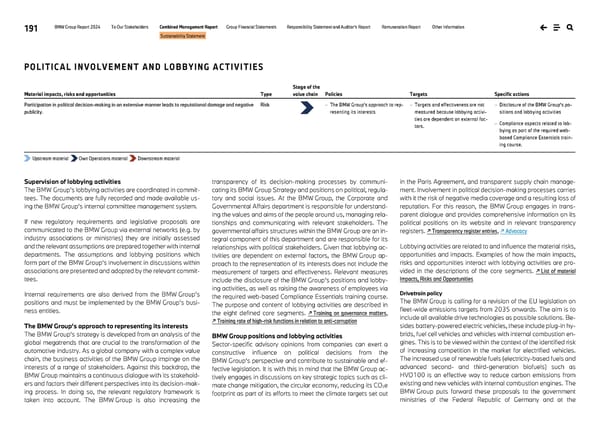191 BMW Group Report 2024 To Our Stakeholders Combined Management Report Group Financial Statements Responsibility Statement and Auditor’s Report Remuneration Report Other Information Sustainability Statement POLITICAL INVOLVEMENT AND LOBBYING ACTIVITIES Material impacts, risks and opportunities Type Stage of the value chain Policies Targets Specific actions Participation in political decision-making in an extensive manner leads to reputational damage and negative publicity. Risk − The BMW Group’s approach to rep- resenting its interests − Targets and effectiveness are not measured because lobbying activi- ties are dependent on external fac- tors. − Disclosure of the BMW Group’s po- sitions and lobbying activities − Compliance aspects related to lob- bying as part of the required web- based Compliance Essentials train- ing course. Upstream material Own Operations material Downstream material Supervision of lobbying activities The BMW Group’s lobbying activities are coordinated in commit- tees. The documents are fully recorded and made available us- ing the BMW Group’s internal committee management system. If new regulatory requirements and legislative proposals are communicated to the BMW Group via external networks (e.g. by industry associations or ministries) they are initially assessed and the relevant assumptions are prepared together with internal departments. The assumptions and lobbying positions which form part of the BMW Group’s involvement in discussions within associations are presented and adopted by the relevant commit- tees. Internal requirements are also derived from the BMW Group’s positions and must be implemented by the BMW Group’s busi- ness entities. The BMW Group’s approach to representing its interests The BMW Group’s strategy is developed from an analysis of the global megatrends that are crucial to the transformation of the automotive industry. As a global company with a complex value chain, the business activities of the BMW Group impinge on the interests of a range of stakeholders. Against this backdrop, the BMW Group maintains a continuous dialogue with its stakehold- ers and factors their different perspectives into its decision-mak- ing process. In doing so, the relevant regulatory framework is taken into account. The BMW Group is also increasing the transparency of its decision-making processes by communi- cating its BMW Group Strategy and positions on political, regula- tory and social issues. At the BMW Group, the Corporate and Governmental Affairs department is responsible for understand- ing the values and aims of the people around us, managing rela- tionships and communicating with relevant stakeholders. The governmental affairs structures within the BMW Group are an in- tegral component of this department and are responsible for its relationships with political stakeholders. Given that lobbying ac- tivities are dependent on external factors, the BMW Group ap- proach to the representation of its interests does not include the measurement of targets and effectiveness. Relevant measures include the disclosure of the BMW Group’s positions and lobby- ing activities, as well as raising the awareness of employees via the required web-based Compliance Essentials training course. The purpose and content of lobbying activities are described in the eight defined core segments. ↗ Training on governance matters, ↗ Training rate of high-risk functions in relation to anti-corruption BMW Group positions and lobbying activities Sector-specific advisory opinions from companies can exert a constructive influence on political decisions from the BMW Group’s perspective and contribute to sustainable and ef- fective legislation. It is with this in mind that the BMW Group ac- tively engages in discussions on key strategic topics such as cli- mate change mitigation, the circular economy, reducing its CO2e footprint as part of its efforts to meet the climate targets set out in the Paris Agreement, and transparent supply chain manage- ment. Involvement in political decision-making processes carries with it the risk of negative media coverage and a resulting loss of reputation. For this reason, the BMW Group engages in trans- parent dialogue and provides comprehensive information on its political positions on its website and in relevant transparency registers. ↗ Transparency register entries, ↗ Advocacy Lobbying activities are related to and influence the material risks, opportunities and impacts. Examples of how the main impacts, risks and opportunities interact with lobbying activities are pro- vided in the descriptions of the core segments. ↗ List of material Impacts, Risks and Opportunities Drivetrain policy The BMW Group is calling for a revision of the EU legislation on fleet-wide emissions targets from 2035 onwards. The aim is to include all available drive technologies as possible solutions. Be- sides battery-powered electric vehicles, these include plug-in hy- brids, fuel cell vehicles and vehicles with internal combustion en- gines. This is to be viewed within the context of the identified risk of increasing competition in the market for electrified vehicles. The increased use of renewable fuels (electricity-based fuels and advanced second- and third-generation biofuels) such as HVO100 is an effective way to reduce carbon emissions from existing and new vehicles with internal combustion engines. The BMW Group puts forward these proposals to the government ministries of the Federal Republic of Germany and at the
 BMW Group Report 2024 Page 190 Page 192
BMW Group Report 2024 Page 190 Page 192